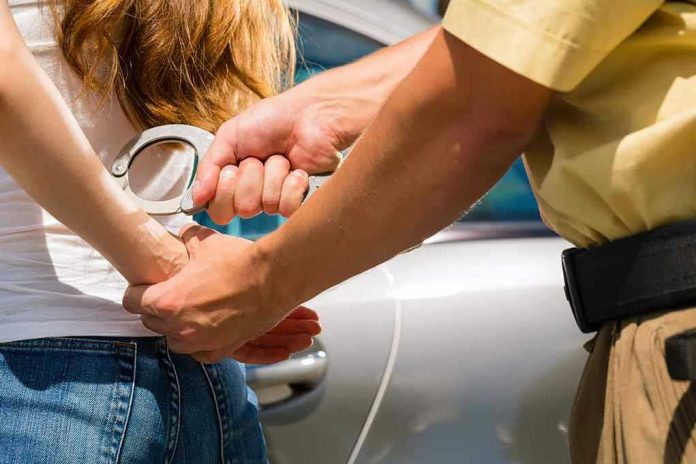
When a reality TV star’s flight home from a glitzy convention spirals into an FBI investigation for possible federal charges, the spectacle exposes the uneasy collision of fame, law, and the sanctity of airline safety.
Story Snapshot
- Porsha Williams, “Real Housewives of Atlanta” star, is under FBI investigation after a Delta flight incident.
- The altercation, shrouded in secrecy, could lead to serious federal charges for interfering with airline crew.
- Both Williams and the other passenger claim victimhood, fueling a media frenzy and divided public opinion.
- The case tests how far celebrity status can bend—or break—federal law and industry accountability.
Porsha Williams’ Turbulent Descent from BravoCon to FBI Scrutiny
Returning from BravoCon 2025, Porsha Williams boarded a Delta flight from Las Vegas to Atlanta expecting the usual post-convention exhaustion. Instead, the trip ended in chaos. Law enforcement met the plane on arrival, escorting Williams off in front of stunned passengers and, soon after, the nation’s cameras. The FBI confirmed it was investigating whether Williams’ actions warranted federal prosecution, citing laws that criminalize interference with crew duties. The incident’s details remain murky, but the stakes are crystal clear: Williams faces the possibility of federal charges, an extraordinary outcome even for a reality TV star.
Delta Airlines, ever cautious, offered scant details, acknowledging only that “two customers on the flight were spoken to by cabin crew.” The FBI’s terse statement—“We are looking to see whether any federal charges may or may not apply”—underscored the seriousness with which authorities treat airline disruptions. The presence of a celebrity only amplifies the attention, setting the stage for a high-profile legal drama where the rules are anything but scripted.
The Legal High Wire of Celebrity in the Skies
Federal law, specifically 49 U.S.C. § 46504, leaves little ambiguity: interference with airline crew is a serious offense, regardless of a passenger’s fame or following. Williams’ legal history, including a 2014 misdemeanor battery charge after an on-set clash, adds gravity to the current predicament. While reality TV thrives on confrontation, the federal government draws a hard line at 30,000 feet. In recent years, passengers—celebrity or otherwise—have faced prosecution for inflight altercations, especially in a post-9/11 security environment and amid pandemic-era tensions. This case may become a litmus test for whether notoriety helps or hinders when federal law is on the line.
Public statements only deepen the intrigue. Williams’ attorney insists she was “verbally assaulted by an irate and unhinged passenger without provocation,” framing her as the wronged party. The other passenger’s identity and version of events remain concealed. What is known: no charges have been filed as of November 19, 2025, and the investigation is ongoing. Media outlets, from TMZ to Us Weekly, circulate video of Williams deplaning, fueling speculation but offering little clarity about what transpired onboard.
Media Frenzy, Public Divides, and the Future of Accountability
Williams’ celebrity status ensures every development is magnified, with fans and critics dissecting every official statement and social media post. On the ground, Williams projects confidence, continuing her public appearances and posting about mental health and gratitude—never directly addressing the incident itself. Meanwhile, the Bravo network and the reality TV industry watch closely. The outcome could shape how producers vet and manage their casts, especially as real-world controversies threaten to overshadow on-screen drama.
Legal experts highlight that prosecution under 49 U.S.C. § 46504 varies widely, with outcomes dependent on the investigation’s findings and prosecutorial discretion. Some commentators argue that the very incentives of reality TV—drama, confrontation, spectacle—may be bleeding into situations with real-world consequences. Aviation experts stress the absolute priority of safety and law enforcement aboard commercial flights, regardless of who is in seat 3A. The case prompts broader questions about celebrity privilege and accountability: does fame confer leniency, or does it merely ensure every misstep is publicized and punished?
Unanswered Questions and the Stakes for Celebrity Culture
No footage or eyewitness accounts of the actual incident have been released, leaving a vacuum filled by speculation. Both Williams and her attorney maintain a narrative of victimhood, while airline and federal officials maintain procedural silence. As the investigation continues, the industry braces for fallout. Williams’ career, Delta’s reputation, and the way airlines handle high-profile disruptions all hang in the balance.
‘Real Housewives of Atlanta’ star could face federal charges following incident on Delta flight https://t.co/pKB61VuSux
— WSB-TV (@wsbtv) November 18, 2025
For now, Williams walks a legal and reputational tightrope, her fate undecided. The story stands as a cautionary tale about the limits of celebrity, the reach of federal law, and the enduring drama when reality TV collides with reality itself. The outcome may well redefine the boundaries of accountability for those whose fame travels with them—sometimes, even at 35,000 feet.

